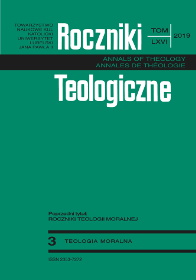On an Amendment of the Morality of a Physicist's Professional Actions. A New Element of Inculturation of Christianity into a Scientific-Technological Civilization
Abstrakt
O zmianie moralności profesjonalnych działań fizyka. Nowy element inkulturacji chrześcijaństwa w cywilizację naukowo-technologiczną
Fizycy są zobowiązani, zgodnie z ustalonymi metodami i standardami fizyki, do myślenia i działania w ramach epistemologicznych, na co głęboki wpływ miał I. Kant. Klimat epistemologiczny, w którym się znajdują, sprzeciwia się epistemologicznemu klimatowi realizmu naturalnego, a tym samym epistemologicznemu klimatowi Objawienia chrześcijańskiego, kiedy mówi ono o naszym świecie. Ten kontrast niszczy wewnętrzną harmonię świata umysłowego każdego fizyka w takim stopniu, w jakim zależy on od jego ogólnego sposobu myślenia, a także od jego pracy zawodowej. Sytuacja ta trwa od czasów rewolucji naukowej XVII wieku, tak że wcześniejsza cywilizacja odznaczająca się realizmem i duchem chrześcijańskim została w zasadzie zastąpiona przez cywilizację naukowo-technologiczną.
Historyczny rozwój fizyki doprowadził do sytuacji, w której praca zawodowa fizyków, z jej niewątpliwymi sukcesami i wkładem w postęp, prowadzi wraz z moralnie godziwym przedmiotem do dwóch złych skutków. Pierwszym złym skutkiem jest współistnienie w umyśle fizyka dwóch przeciwnych epistemologicznych klimatów, co niszczy wewnętrzną harmonię jego świata umysłowego. Natychmiast pociąga to za sobą drugi zły skutek w sytuacji, gdy fizyk, aby być zawodowo konkurencyjnym, jest zmuszony do przestrzegania metod i standardów fizyki, tak jak teraz. W ten sposób przyczynia się do braku harmonii w jego umysłowym świecie i poprzez swój drobny wkład utrwala ducha tych metod i standardów. W trudniejszej sytuacji jest fizyk, który jest chrześcijaninem i chce wykonywać swoją pracę zawodową na chwałę Boga (por. 1 Kor 10,31). W obu przypadkach fizyk, wykonując swoją pracę zawodową, w praktyce zaprzecza o tym, o czym jest w teorii przekonany, a mianowicie o realizmie naturalnym, a dodatkowo, w przypadku chrześcijanina także o tym, że chrześcijańskie Objawienie mówi o naszym świecie w duchu naturalnego realizmu.
Wszystko to nie jest nieznane, ale mimo to jest praktycznie pomijane w dyskursie akademickim. W związku z tym, celem tego artykułu jest zwrócenie uwagi na powyższą kwestię, a następnie wskazanie kilku sposobów dokładniejszego zbadania kontrastu epistemologicznych klimatów, ponieważ fizyka jest częściowo kształtowana przez eksperymenty, a jej historyczny rozwój jest również częściowo warunkowy. Dlatego możliwe jest osiągnięcie lepszej harmonii epistemologicznych klimatów fizyki i realizmu naturalnego. Artykuł sugeruje także pewne idee w tym zakresie. Jeśli okażą się one owocne, przyczynią się do inkulturacji chrześcijaństwa w naszej cywilizacji naukowo-technicznej. Innymi słowy stanowiłoby to wsparcie dla nowej ewangelizacji.
Bibliografia
Dijksterhuis, Eduard J. The Mechanization of the World Picture. Oxford: Oxford University Press, 1961.
First Vatican Council. Dogmatic Constitution Dei Filius.
Hartmann, Nicolai. Grundzüge einer Metaphysik der Erkenntnis. Berlin: Walter de Gruyter, 1965. The passages cited in the text are available online under https://books.google.fi/books?id=YaEhAAAAQBAJ&hl=fi&source=gbs_book_other_versions; click `Realistische Theorien'. Retrieved 10.06.2019.
Hawking, Stephen, Mlodinow, Leonid. The Grand Design – A New Explanation of the Universe. New York: Bantam Books (Random House), 2010.
Hertz, Heinrich. The Principles of Mechanics Presented in a New Form. London: Macmillan & Co. Ltd., 1899. Online: https://archive.org/details/principlesofmech00hertuoft/page/xxviii. Retrieved 11.06.2019.
Ioannes Paulus II. Encyclical Fides et ratio (1998).
Kant, Immanuel. Critique of pure Reason (first edition (1781) and second edition (1787)), www.earlymoderntexts.com/authors/kant/; ed. Jonathan Bennett. Retrieved 11.06.2019.
Larenz, Rudolf. Physics – `Alienation from' instead of `Orientation towards' the Creator? Roczniki Teologii Moralnej [Lublin] 2011, 3(58): 5-37. Online: http://cejsh.icm.edu.pl/cejsh/element/bwmeta1.element.desklight-92c8dcdd-f35a-44d5-818d-0a757f71d714. Retrieved 11.06.2019.
Larenz, Rudolf. What Can Thomistic Philosophy of Nature Contribute to Physics? Societal Studies [Vilnius] 2013, 5(2): 481-499. Online: https://www.mruni.eu/en/mokslo_darbai/sms/archyvas/dwn.php?id=346139,or www.ceeol.com/aspx/issuedetails.aspx?issueid=a32d97e6-e73e-4341-6a52-beca82334a4e. Retrieved 11.06.2019.
Larenz, Rudolf. Substance and Dynamics: Two Elements of Aristotelian-Thomistic Philosophy of Nature in the Foundation of Mathematics in Physics. Studia Gilsoniana 2017, 6(3): 451-483. Online www.gilsonsociety.com/files/ 451-483-Larenz.pdf. Retrieved 11.06.2019.
A shorter previous version appeared in Polish in: O metafizyce Arystotelesa. U podstaw filozofowania realistycznego. Zadania współczesnej metafizyki. Lublin: Polskie Towarzystwo Tomasza z Akwinu, Lublin, 2017, p. 191-220. (Substancja i dynamika. Dwa elementy arystotelesowsko-tomistycznej filozofii przyrody jako podstawa matematyki w fizyce).
Popper, Karl, R. The Logic of Scientific Discovery. London: Routledge (Routledge Classics), 2002. Online: https://archive.org/details/PopperLogicScientificDiscovery/page/xx. For the particular quotation in the text, “xx” should be replaced by “n307”. Retrieved 11.06.2019.
Shapiro, Steward. Thinking about Mathematics. The Philosophy of Mathematics. Oxford: Oxford University Press, 2000.
Second Vatican Council. Pastoral Constitution Gaudium et spes (1965).
Copyright (c) 2019 Roczniki Teologiczne

Utwór dostępny jest na licencji Creative Commons Uznanie autorstwa – Użycie niekomercyjne – Bez utworów zależnych 4.0 Międzynarodowe.





